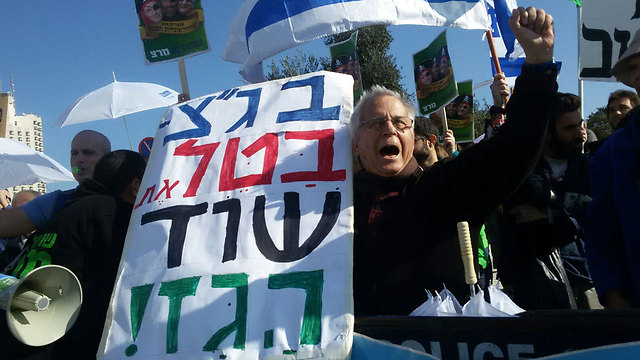Prime Minister Benjamin Netanyahu is to appear before the High Court of Justice to explain his position on the agreement on the future of Israel's natural gas field, it was agreed on Wednesday in a hearing with an expanded quorum of five judges on a series of appeals against the deal.
The appeals were filed by several organizations for social change among them the Movement for Quality Government in Israel (MQG), Adam Teva V'Din, The College of Law and Business in Ramat Gan, along with Meretz Chairwoman Zehava Gal-On and the Zionist Union. Dozens of protestors that oppose the gas pipelines gathered outside the courthouse in Jerusalem.
During the hearing, the justices requested that government representatives agree to give a conditional order in order to debate the gas fields and to more quickly reach a decision. A hearing after the provision of a conditional order is primarily intended to hasten judicial processes. "If you won't agree, we won't conduct the hearing and this will stretch out for months," Justice Uzi Fogelman warned.
The government agreed to this offer but requested additional time in order to present its claims and also to allow Energy Minister Yuval Steinitz to appear before the court. "We would also request to allow the prime minister to speak on this matter," they added.
Justice Elikim Rubinstein said in response: "We suggest that the prime minister file an affidavit and arrive at the start of the next hearing." The judges requested that the classified information be presented in order to test the decision-making process regarding the gas deal.
This request is considered quite extraordinary. Usually only lawyers appear in the Supreme Court, and only rarely are other entities heard. But if filing an affidavit is sufficient for them, this is standard procedure.
The appeals deal with the legality of the gas deal and how it is to operate. The College of Law and Business requested in its appeal the nullification of the clause determining that it will be illegal to make changes in the gas deal for ten years, claiming this paragraph was flawed and unreasonable.
Other social organizations claimed that the gas companies had gained control of a precious public commodity and that it was wrong to allow them to exploit their power to become a monopoly. The appeals also claim that the approval process of the gas deal circumvented the Antitrust Authority.
"Monopoly is not preordained fate, a historical inheritance or an unpreventable constraint," read the appeal. "It’s a direct result of illegal conduct by the gas companies in the past couple of years, and of the surprising laxness of the state authorities regarding enforcement of the law," the appeal states. not allowed to constrain its discretion and that of the other governance authorities."
The groups also claimed that "if the deal is authorized, it will be very easy for the monopoly to enforce its will. As the dependence on gas grows, so will the monopoly's power. It might create corruption, and the vision of energy security and independence will vanish."

















